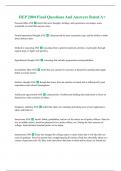DEP 2004 Final Questions And Answers Rated A+
Personal fable ANS belief that one's thoughts, feelings, and experiences are unique, more
wonderful or awful than anyone else's.
Formal operational thought ANS characterized by more systematic logic and the ability to think
about abstract ideas
Deductive reasoning ANS reasoning from a general statement, premise, or principle, through
logical steps, to figure out specifics.
Hypothetical thought ANS reasoning that includes propositions and possibilities
Invincibility fable ANS belief that one cannot be overcome or harmed by anything that might
defeat a normal mortal.
Intuitive thought ANS though that arises from an emotion or hunch and is influenced by past
experiences and cultural assumptions
Adolescent egocentrism ANS characteristic of adolescent thinking that leads them to focus on
themselves to the exclusion of others.
Imaginary audience ANS belief that others are watching and taking note of one's appearance,
ideas, and behavior
foreclosure ANS Jacob's father, grandfather, and two of his uncles are all police officers. Since he
was in middle school, Jacob has planned to be a police officer, too. During his first semester of
college, Jacob declared criminal justice as his major.
moratorium ANS Rudy has changed his college major so many times that it will take him sex
years to graduate. Since his parents have stopped paying his tuition, Rudy has cheerfully taken on a
variety of part-time jobs. He likes work that allows him time to think and be alone; his friends are
,much the same way. Rudy's grades are generally high, though he has some incompletes. He has had
one very satisfying intimate relationship and is searching for another.
identity achievement ANS Janeesa spent her senior year of high school exploring career options
within the field of education. She attended career fairs and shadowed a social worker, school
principal, special education teacher, and a speech and language pathologist. During her second year
in college, Janeesa declared her major in special education.
foreclosure ANS Lynn's mother is a professor women's studies who is deeply involved in
feminist issues. Lynn very much admires her mother. Lynn believes that she will be a strong and
independent woman like her mother. She avoids people who either don't see her in that light or try to
bring out her feminine nature. She steers clear of her paternal grandmother, who is a very
disorganized and "artsy" person. Lynn's college grades are high, and her course selections reflect an
unwavering interest in women's studies and psychology.
Diffused ANS Ashton is a junior in high school and seems uninterested in college or trade school.
He has worked server par-time jobs but quit each within a few weeks. When asked what he wants to
do with his life, Ashton usually says, "It really doesn't matter to me what I do. I'm not in any hurry to
go to college or start a career. There's plenty of time for that later."
moratorium ANS Yuri is about to finish high school. Although she plans to attend college, Yuri
has not decided what she wants to do with her life. She has considered medicine, law, and social
work. Yuri has volunteered at a nursing home and currently works par-time as a secretary for a small
law firm. Yuri plans to spend her first year or two of college exploring her options before settling on
a major.
identity achievement ANS Melissa's parents are both physicians. In college she majored in
French, spending a semester in France studying art and culture. Upon graduation she surprised her
parents by announcing that she had applied to medical school. A close relationship with a hospice
nurse and a summer job as a hospital volunteer had helped her arrive at the decision.
The sequence of puberty hormone production that originates in the brain and ends with glands
located atop the kidneys is known by the acronym _____. ANS HPA axis
Which term refers to reasoning from a general statement, premise, or principle, through logical steps,
to figure out specifics? ANS deductive reasoning
, The term imaginary audience refers to adolescents' _____. ANS belief that everyone is watching
their behavior and appearance
At what age does the brain become fully mature? ANS Early twenties
For girls, menarche is _____. ANS a girl's first menstrual period
Callie called her friend Sue on Saturday to see if Sue wanted to go to the movies. Sue told Callie she
was staying home to study for their upcoming history test. After the call, Callie decided to study
instead of go to the movies. Callie was experiencing _____. ANS peer pressure
The belief that one cannot be harmed by things that would hurt someone else is referred to as _____.
ANS the invincibility fable
Piaget called the reasoning that characterizes adolescence _____. ANS Formal operational
thought
For boys, the first ejaculation of seminal fluid is _____. ANS spermarche
Which adolescent appears to be experiencing identity diffusion?
-Jeannine, who runs away from a pressured home environment and joins a commune
-Fred, who is pressured by his parents to become a doctor
-Barbara, a college student who frequently changes majors
-Zachary, who spends most of his time watching TV and hanging out with his friends ANS
Zachary, who spends most of his time watching TV and hanging out with his friends
According to Erikson, the goal of adolescence is to _____. ANS find one's own identity
The notion that two networks exist within the human brain, one for emotional and one for analytical
processing of stimuli, is called _____. ANS dual-process model




